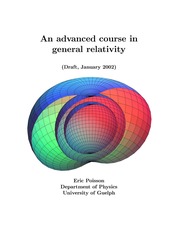
|
FreeComputerBooks.com
Links to Free Computer, Mathematics, Technical Books all over the World
|
|
- Title: An Advanced Course in General Relativity
- Author(s) Eric Poisson
- Publisher: Internet Archive
- License(s): N/A
- Hardcover: N/A
- eBook: PDF (190 pages), ePub, Kindle, etc.
- Language: English
- ISBN-10: N/A
- ISBN-13: N/A
- Share This:

|
These lecture notes are suitable for a one-semester course at the graduate level. Table of contents: Fundamentals; Geodesic congruences; hypersurfaces; Lagrangian and Hamiltonian formulations of general relativity; Black holes.
Focusing on conceptual clarity, he derives all the basic results in the simplest way, taking care to explain the physical, philosophical and mathematical ideas at the heart of "the most beautiful of all scientific theories". Some of the main applications of General Relativity are also explored, for example, black holes, gravitational waves and cosmology, and the book concludes with a brief introduction to quantum gravity.
About the Authors- N/A
- Physics, Mathematical Physics
- Applied Mathematics
- Calculus and Mathematical Analysis (Real Analysis, Functional Analysis, etc.)

- An Advanced Course in General Relativity (Eric Poisson)
- The Mirror Site (1) - PDF
- The Mirror Site (2) - PDF
- Video Lectures - YouTube
-
 Foundations of General Relativity: From Einstein to Black Holes
Foundations of General Relativity: From Einstein to Black Holes
The book is intended for all students of general relativity of any age and orientation who have a background including at least first courses in special and general relativity, differential geometry, and topology.
-
 Relativity: The Special and General Theory (Albert Einstein)
Relativity: The Special and General Theory (Albert Einstein)
The great physicist himself disclaimed this exclusionary view, and in this book, he explains both theories in their simplest and most intelligible form for the layman not versed in the mathematical foundations of theoretical physics.
-
 The Einstein Theory of Relativity (Hendrik A. Lorentz)
The Einstein Theory of Relativity (Hendrik A. Lorentz)
The books published on the subject are so technical that only a person trained in pure physics and higher mathematics is able to fully understand them. In order to make a popular explanation of this far-reaching theory available, the present book is published.
-
 Introduction to Classical and Quantum Computing (Tom Wong)
Introduction to Classical and Quantum Computing (Tom Wong)
This book is for students who want to learn quantum computing beyond a conceptual level, but who lack advanced training in mathematics. The only prerequisite is trigonometry, and mathematics beyond that will be covered.
-
 Quantum Computing for the Quantum Curious
Quantum Computing for the Quantum Curious
This open access book makes quantum computing more accessible than ever before. It bridges the gap between popular science articles and advanced textbooks by making key ideas accessible with just high school physics as a prerequisite.
-
 Geometry with an Introduction to Cosmic Topology
Geometry with an Introduction to Cosmic Topology
The text uses Mobius transformations in the extended complex plane to define and investigate these three candidate geometries, thereby providing a natural setting in which to express results common to them all, as well as results that encapsulate key differences.
-
 Statistical Mechanics of Lattice Systems: Mathematical Introduction
Statistical Mechanics of Lattice Systems: Mathematical Introduction
This motivating textbook gives a friendly, rigorous introduction to fundamental concepts in equilibrium statistical mechanics, covering a selection of specific models, including the Curie–Weiss and Ising models, the Gaussian free field, etc.
-
 Principles of Mechanics: Fundamental University Physics
Principles of Mechanics: Fundamental University Physics
This textbook takes the reader step-by-step through the concepts of mechanics in a clear and detailed manner. Many proofs and examples are included to help the reader grasp the fundamentals fully, paving the way to deal with more advanced topics.
-
 Structure and Interpretation of Classical Mechanics
Structure and Interpretation of Classical Mechanics
This innovative textbook concentrates on developing general methods for studying the behavior of classical systems. It focuses on the phenomenon of motion and makes extensive use of computer simulation in its explorations of the topic.
-
 Variational Principles in Classical Mechanics (Douglas Cline)
Variational Principles in Classical Mechanics (Douglas Cline)
This book introduces variational principles and their application to classical mechanics. The relative merits of the intuitive Newtonian vectorial formulation, and the more powerful variational formulations are compared.
-
 Marie Curie and the Science of Radioactivity (Naomi Pasachoff)
Marie Curie and the Science of Radioactivity (Naomi Pasachoff)
Marie Curie discovered radium and went on to lead the scientific community in studying the theory behind and the uses of radioactivity. She left a vast legacy to future scientists through her research, her teaching, and her contributions to the welfare of humankind.





